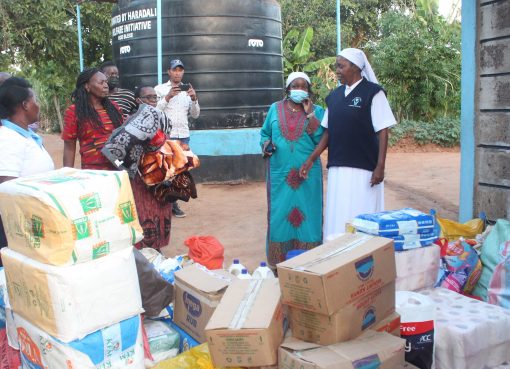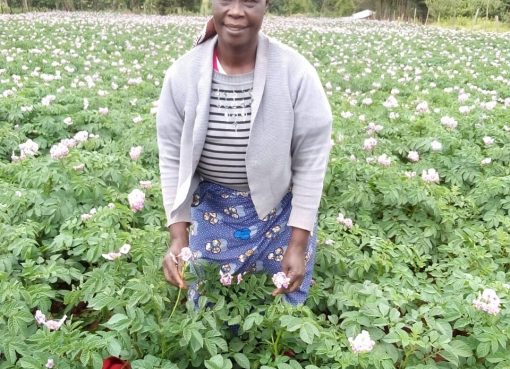Women contribute a lot to agriculture and food security globally. However, the majority of women in Kajiado County have been left behind in this sector mainly because they experience unequal access to land rights, agricultural training, and opportunities to adopt new agricultural technologies.
Non-governmental institutions like the Arid Lands Information Network (ALIN) and the Africa Centre for Sustainable and Inclusive Development (AFRICA CSID) have taken the initiative to offer training to women groups in Kajiado on climate-smart agriculture, climate change, and addressing issues of gender disparities in agriculture.
Apart from the training, ALIN has sponsored the women groups with land, farm inputs, and the installation of irrigation systems. ALIN’s agricultural officer, Ms. Leah Wandera, revealed that when they started the project in Kajiado, they identified three women groups and facilitated them with drip irrigation equipment, water storage, and farm inputs.
“We came to Kajiado in March 2023 and identified three women groups, namely, Naanyu Dupoto in Kajiado East, Kokosho Keekonyokie in Kajiado West, and Olkiroriti in Kajiado Central,” said Wandera.
We realised that women and youths have been left behind when it comes to climate-smart agriculture and farming, and so we decided to work with women groups and encourage them to embrace clean energy in farming,” she added.
Wandera said their group assisted and trained the women on how to install the drip irrigation systems, how to plant, take care of their plants, and later on harvest. She said that they are impressed by the progress of the groups, as some can now facilitate themselves.
“As of now, two women groups have already harvested what they planted. Olkiroriti Women Group in Ildamat harvested onions two months ago, sold them, made a profit, and used the profit to plant watermelons for the second season, while Kokosho Keekonyokie Women Group recently harvested cow peas and yellow beans,” said Wandera.
During a two-day training organised by ALIN in partnership with AFRICA CSID, women from different groups in Kajiado had a chance to interact and learn about gender responsive financing and gender mainstreaming in agri-food systems from AFRICA CSID’s Executive Director, Ms. Salome Owuonda.
Owuonda said that it is important for communities to know how the money disbursed for agriculture is supposed to be shared among women, youths, and men. “We have specific needs that are different for specific groups of people within communities,” Owuonda said.
“Even among the indigenous people and the marginalised communities, the roles of women, youth, and the elderly are different, and it is important that we take care of these needs and listen to their interests as well so that whatever solutions we are coming up with are as responsive as possible. If we do not take care of this, we will end up with instances of climate change with maladaptation instead of having climate-resilient communities,” added Owuonda.
Owuonda noted that during her interactions with the women, most of them expressed that they have a challenge in acquiring land and access to information on the role of gender in agriculture and said that she intended to engage more women in trainings to create awareness.
“During our engagement, the women have mentioned issues of land access and control, which is a general issue for women in communities, especially in marginalised communities; they have talked about lack of awareness; they do not know some of these things we are talking about,” said Owuonda.
“ALIN has been in communication with them; we have engaged most of them in different forums, and we will continue so that we create that awareness,” she noted.
Jane Ranketi, the Vice Chairlady of the Naanyu Dupoto Women Group and beneficiaries of ALIN, expressed how the group came together and their journey of successful harvest since their encounter with the ALIN group.
“Our group started as a merry go round; we used to collect and save money to help each other; later on, we shifted to sheep keeping, and after they had matured, we sold them; then we did poultry. When we met ALIN, we had planted capsicum, but due to lack of water, they wilted. They trained us about drip irrigation, and we acquired two acres of land. As of now, we have planted beans and onions, which we are waiting to harvest probably after three months,” said Ranketi.
Ranketi also stated that in their community, it is not easy to do farming because most land is owned by men.
Beatrice Kerubo, the chairlady of the Sachuva women group in Kitengela, said that she has been practicing farming for a long time, and she has had help from a government agricultural officer who has been educating her about farming.
Kerubo said that interacting with women groups who benefited from ALIN has helped her as a farmer, and she has embraced kitchen gardening at home.
By Seline Nyangere





